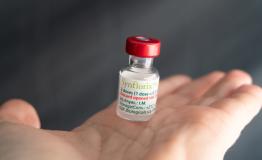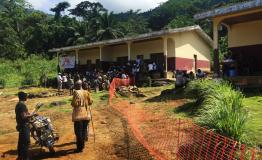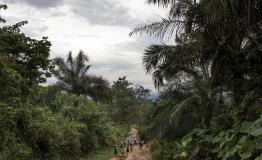

Cameroon
In addition, a second, little-known humanitarian situation has also been evolving in the country's Northwest and Southwest Regions. Violence between government forces and separatist non-state armed groups from the English-speaking community has escalated sharply in recent years, forcing hundreds of thousands of people from their homes and leaving them in dire need of humanitarian assistance.
Our Activities in 2021 in Cameroon
520
52
€16.9 M
16.9M
1,984
1,984

In 2021
2021 was marked by outbreaks of armed violence, resulting in large numbers of displaced people in the Far North and Southwest regions of Cameroon. By mid-year, almost two million people were displaced, according to the United Nations Office for the Coordination of Humanitarian Affairs (OCHA). The level of violence left our teams working in a more volatile context, resulting in limited access to healthcare services for vulnerable people.
To respond to the increasing healthcare needs, we supported hospitals and health centres, and ran a 24-hour ambulance service. We also provided a decentralised model of care through community health volunteers, who are trained to treat simple cases of common diseases.
Limited access to healthcare for vulnerable people
In the Northwest region of Cameroon, where MSF activities were suspended by the authorities in December 2020, we were not granted permission to resume our medical activities and eventually had to remove most staff while maintaining a liaison office in Bamenda. This prolonged suspension left thousands of people deprived of lifesaving medical care.
In addition, in the anglophone Southwest region of Cameroon, we continue to witness public attacks on MSF, harassment and detention of our teams, which drastically reduces medical and humanitarian access. Despite these challenges, we continue to support people through numerous medical interventions, from surgeries to responding to epidemics.
Response to outbreaks
To support the authorities’ response to a cholera outbreak in Ekondo Titi, Southwest region, we treated patients in Idenau, Bamusso and Kombo Itindi health areas. We administered vaccinations, and facilitated water and sanitation and awareness activities on treatment and prevention.
MSF supported the national COVID-19 response during the second and third waves in Buea, Maroua, Mora and Yaoundé. Our response included constructing isolation units, treating patients, donating oxygen supplies, training healthcare staff, providing health promotion and assisting in vaccinations in Yaoundé. We also undertook scientific studies on COVID-19 in Cameroon.

137,600
137,6
2,100
2,1
449
449


Violence in North-West and South-West Cameroon: Five things you need to know

Tens of thousands of Cameroonians seek refuge in southern Nigeria
